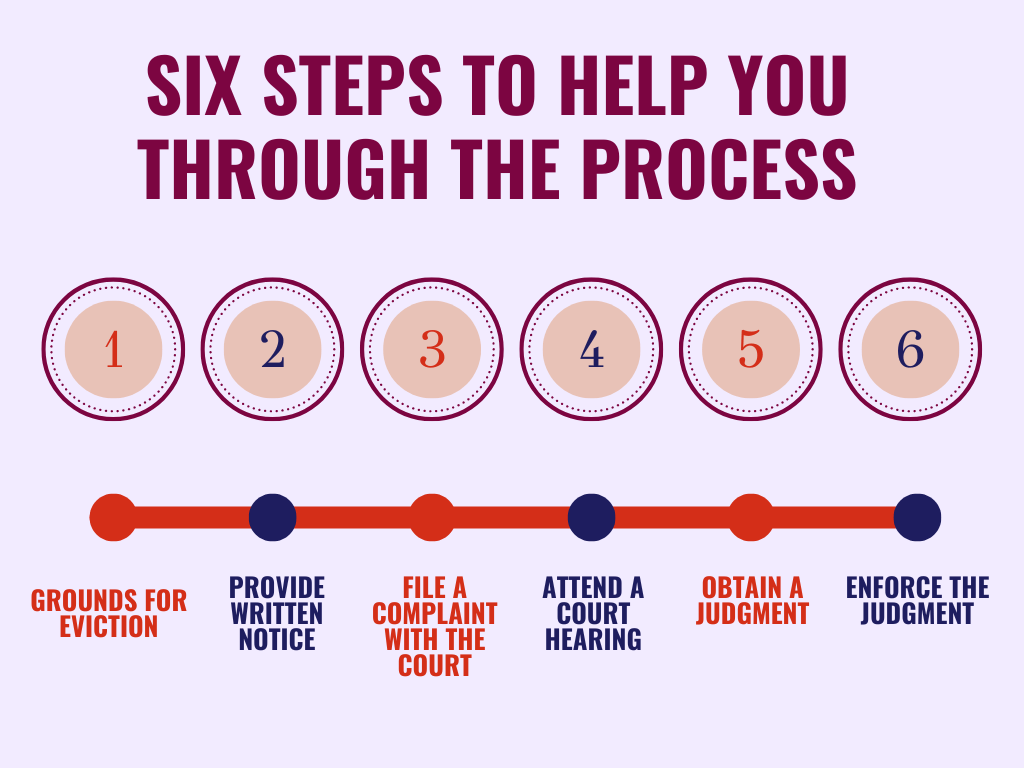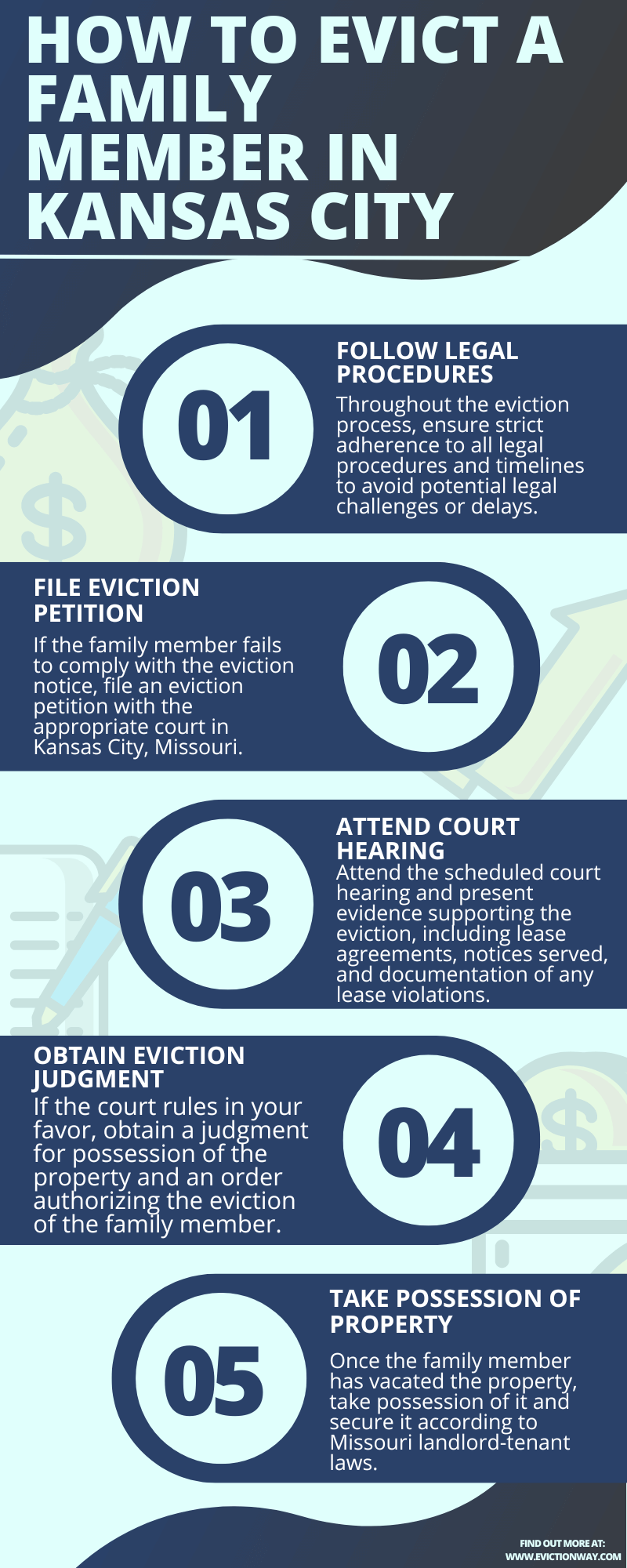Evicting a family member can be a difficult and emotional process, but it may be necessary to protect your rights and property. If you’re facing this situation in Kansas City, this blog article will provide you with the information you need to know.
We’ll share the best way to evict a family member in Kansas City, including the legal steps you need to take. We’ll also provide tips on removing a family member politely, and we’ll discuss the laws involved in evicting a family member.
Whether you’re dealing with a difficult family member or you’re simply trying to protect your property, this blog article will provide you with the information you need to know. So read on to learn more about how to evict a family member in Kansas City.

How To Evict a Family Member In Kansas City
Evicting a family member can be a difficult and emotional process, but it is sometimes necessary to protect your rights and property. If you are considering evicting a family member in Kansas City, it is important to understand the legal process and your rights as a landlord.
1. Determine If You Have Grounds for Eviction
Under Kansas law, there are several grounds for eviction, including:
- Nonpayment of rent
- Violation of the lease agreement
- Engaging in criminal activity
- Causing damage to the property
If you believe that your family member has violated any of these grounds, you can begin the eviction process.
2. Provide Written Notice
The first step in the eviction process is to provide your family member with a written notice to vacate the property. This notice must state the reason for the eviction and the date by which your family member must vacate the property. The notice must be served in person or by certified mail.

3. File a Complaint with the Court
If your family member does not vacate the property by the date specified in the notice, you can file a complaint with the court. The complaint must include a copy of the notice to vacate and a statement of the facts supporting the eviction.
4. Attend a Court Hearing
Once you have filed a complaint, the court will schedule a hearing. At the hearing, you will have the opportunity to present your case to the judge. Your family member will also have the opportunity to present their case.
5. Obtain a Judgment
If the judge finds in your favor, they will issue a judgment for possession of the property. This judgment will give you the legal right to evict your family member from the property.
6. Enforce the Judgment
Once you have obtained a judgment, you can enforce it by hiring a sheriff or constable to evict your family member from the property. The sheriff or constable will physically remove your family member from the property and change the locks.
Evicting a family member can be a difficult process, but it is important to remember that you have rights as a landlord. If you are considering evicting a family member, it is important to seek legal advice to ensure that you are following the proper procedures.

How Much Does it Cost to Evict a Family Member in Kansas City?
Evicting a family member can be a difficult and expensive process. The cost of eviction will vary depending on the specific circumstances of the case, but there are some general costs that you can expect to incur.
| Item | Estimated Cost | Notes |
|---|---|---|
| Filing Fee | $45 – $145 | Depending on the county |
| Service of Process Fee | $50 – $100 per service | Varies by the service provider |
| Attorney Fees | $1,000 – $3,000+ | Based on attorney’s rates |
| Additional Court Costs (if contested) | Varies | Additional filings may be needed |
| Locksmith Services | $50 – $150 | For changing locks post-eviction |
- Filing fees: The initial filing fee for an eviction case in Kansas City is $145. This fee covers the cost of filing the paperwork and serving the eviction notice on the tenant.
- Process server fees: The process server will charge a fee to serve the eviction notice on the tenant. This fee will vary depending on the process server you use, but it is typically around $50 to $100.
- Court costs: If the tenant does not vacate the property after being served with the eviction notice, you will need to go to court to obtain a judgment for possession. The court costs will vary depending on the county in which you file the case, but they are typically around $100.
- Attorney fees: If you hire an attorney to represent you in the eviction process, you will need to pay their fees. Attorney fees can vary widely, but you can expect to pay at least $500 for an attorney to represent you in an eviction case.
FAQs: Evicting a Family Member in Kansas City
Here are some of the most frequently asked questions about evicting a family member in Kansas City:
What are the legal grounds for evicting a family member in Kansas City?
In Kansas City, you can evict a family member if they have violated the terms of their tenancy, such as not paying rent or breaking the lease. You can also evict a family member if they are causing a nuisance or disturbance to other tenants or neighbors.
What is the process for evicting a family member in Kansas City?
The process for evicting a family member in Kansas City is similar to the process for evicting any other tenant. You must first give the family member a written notice to vacate the property. If the family member does not vacate the property within the time specified in the notice, you can file an eviction lawsuit with the court.
Can I kick someone out of my house without notice in Missouri?
No, Missouri law requires landlords to provide written notice to tenants before eviction, even for lease violations.
Can a landlord evict you without going to court in Missouri?
No. In Missouri, a landlord cannot evict a tenant without going to court. Eviction requires a court order.
How much notice does a landlord have to give a tenant to move out in Missouri?
In Missouri, a landlord must give a tenant at least 30 days’ written notice to vacate the premises, unless the lease agreement specifies a different period.
How much time does a landlord have to give a tenant to move out in Missouri?
| Tenancy Type | Notice Period |
|---|---|
| Month-to-Month | 30 Days |
| Year-to-Year (over 1 year) | 60 Days |
| Lease Violation (with no cure period) | 10 Days |
What is an illegal eviction in Missouri?
In Missouri, an illegal eviction, also called a “self-help eviction,” happens when a landlord removes a tenant from their property without a court order.
What are some tips for evicting a family member in Kansas City?
Here are some tips for evicting a family member in Kansas City:
- Document all of the reasons why you are evicting the family member.
- Give the family member a written notice to vacate the property.
- File an eviction lawsuit with the court if the family member does not vacate the property within the time specified in the notice.
- Be prepared to pay court costs and attorney fees.
What are some resources for help with evicting a family member in Kansas City?
There are several resources available to help you with evicting a family member in Kansas City. You can contact the following organizations for assistance:
- The Legal Aid Society of Kansas City
- The Kansas City Bar Association
- The Kansas City Tenants Union
Related:
How to Evict a Family Member in San Mateo
